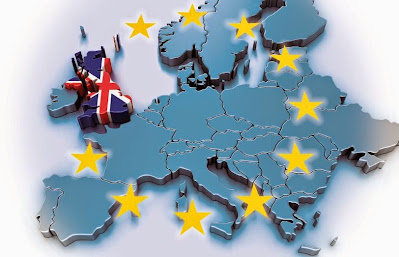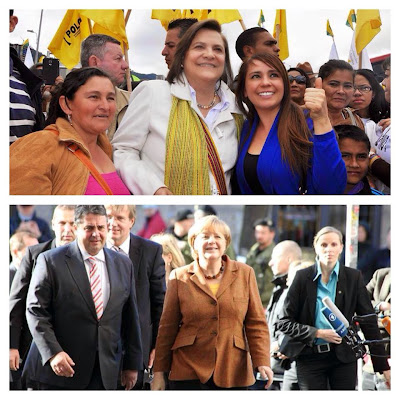There are lots of things we could all complain about, and on various occasions this blog has touched on many of them.
For sure it can be good to vent every now and again, but you have to find the balance between highlighting malpractices and letting them personally affect you, especially when they don’t have to.
There are some things we can change, or at least try to, there are others we cannot.
Yet, for all those things that frustrate and even downright anger many, the expatriates who stay in Colombia – and Bogotá specifically – aren't generally doing so out of stubbornness or against their will.
 |
| At times Bogotá (and Colombia in general) feels a little surreal. (Photo: Pieter Hupkes.) |
No, they're here, or we're here to include myself in that, because we want to be here, more or less.
Every now and again, naturally enough, that stance is brought into question: 'Why am I here?' (Bearing in mind that just over six years ago I knew next to nothing about the place; that’s still the case in some ways.)
Somewhat paradoxically, that came into my mind whilst going through the process of renewing my visa. Buying myself more time in the country; outwardly endorsing the place, in effect.
A Colombian friend helped in putting those seeds of doubt into my mind. “I find it bemusing” she said, “when I see Westerners making an effort and spending a relatively large amount of money in a bid to stay longer in Colombia.”
A case of 'the grass is always greener' you could say. For many Colombians, almost anywhere (in the West) is better than here when it comes to enjoying a higher standard of living.
On the flip side, those of us who come here, to mention just one reason anyway, are attracted by the sense of adventure in trying to make it in a 'developing' country.
And maybe that's the best reason I can give as to why I'm still here. It has been a place to try new things while pretty much being my own boss. It is not a life on Easy Street, taking the lazy option and wasting away one’s life as some seem to think.
Nor do many come to this country to get rich quick (if they do, it's generally down to hard work and/or being in the right place at the right time). There are better options in the world in that regard. But personally, on the balance of things, it has been fun, a big learning curve and, I like to think, beneficial, too.
Heck, at times it has even felt like living in a fantasy land, a dreamworld, doing things that perhaps in more 'developed' countries I wouldn't have the opportunity to do, or at least not the same scope.
Each time it seems like endgame has been reached, another card comes along to keep me playing at the Colombian table, so to put it.
Be that as it may, it still feels unlikely that this part of the world will be my home indefinitely. That might be due to the fact that the ‘traditional’, ‘settled’ life of buying a house, finding a long-term partner, having children and working in a ‘proper’ job floats around in my thoughts – you know, do what ‘normal’ people do.
In that regard, I don’t envisage Bogotá, this place where life sometimes seems a little surreal, offering that kind of existence – the long-term partner and having children elements are certainly in the realms of fantasy at this remove anyway.
Then again, maybe this Colombian ‘dreamland’ is the real deal. Am I living the dream, yet blissfully unaware of it?
Every now and again, naturally enough, that stance is brought into question: 'Why am I here?' (Bearing in mind that just over six years ago I knew next to nothing about the place; that’s still the case in some ways.)
Somewhat paradoxically, that came into my mind whilst going through the process of renewing my visa. Buying myself more time in the country; outwardly endorsing the place, in effect.
A Colombian friend helped in putting those seeds of doubt into my mind. “I find it bemusing” she said, “when I see Westerners making an effort and spending a relatively large amount of money in a bid to stay longer in Colombia.”
A case of 'the grass is always greener' you could say. For many Colombians, almost anywhere (in the West) is better than here when it comes to enjoying a higher standard of living.
On the flip side, those of us who come here, to mention just one reason anyway, are attracted by the sense of adventure in trying to make it in a 'developing' country.
And maybe that's the best reason I can give as to why I'm still here. It has been a place to try new things while pretty much being my own boss. It is not a life on Easy Street, taking the lazy option and wasting away one’s life as some seem to think.
Nor do many come to this country to get rich quick (if they do, it's generally down to hard work and/or being in the right place at the right time). There are better options in the world in that regard. But personally, on the balance of things, it has been fun, a big learning curve and, I like to think, beneficial, too.
 |
| Typecast: Wrong Way has proven himself to be an 'effective' cop in Colombia. |
Each time it seems like endgame has been reached, another card comes along to keep me playing at the Colombian table, so to put it.
Be that as it may, it still feels unlikely that this part of the world will be my home indefinitely. That might be due to the fact that the ‘traditional’, ‘settled’ life of buying a house, finding a long-term partner, having children and working in a ‘proper’ job floats around in my thoughts – you know, do what ‘normal’ people do.
In that regard, I don’t envisage Bogotá, this place where life sometimes seems a little surreal, offering that kind of existence – the long-term partner and having children elements are certainly in the realms of fantasy at this remove anyway.
Then again, maybe this Colombian ‘dreamland’ is the real deal. Am I living the dream, yet blissfully unaware of it?
If so, let’s hope that it doesn’t turn into a case of ‘you don’t know what you’ve got till it’s gone.’
__________________________________
Facebook: Wrong Way Corrigan - The Blog & IQuiz "The Bogotá Pub Quiz".
__________________________________
Facebook: Wrong Way Corrigan - The Blog & IQuiz "The Bogotá Pub Quiz".




